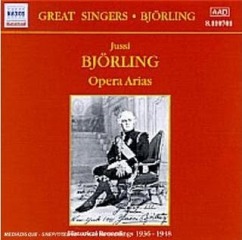Jussi Bjorling - Opera Arias 1936-48 (1999)
Jussi Bjorling - Opera Arias 1936-48 (1999)

01 - Una Furtive Lagrima play 02 - Questa O Quella 03 - La Donna E Mobile 04 - Ah Si Ben Mio 05 - Di Quella Pira 06 - Celeste Aida 07 - Cielo E Mar 08 - O Paradiso 09 - M'appari Tutt'amor 10 - Salut! Demuere Chaste E Pure 11 - Ah! Leve-toi Soleil! 12 - Le Fleur Que Tu M'avais Jetee 13 - En Fermant Les Yeux 14 - Ah! Fuyez, Douce Image 15 - O Lola 16 - Quel Vino 17 - Vesti La Giubba 18 - Amor Ti Vieta 19 - Donna Non Vidi Mai 20 - Che Gelida Manina 21 - Recondita Armonia 22 - E Lucevan Le Stella play 23 - Nessun Dorma Composed By – Ponchielli (tracks: 7), Gounod (tracks: 10, 11), Giordano (tracks: 18),
Flotow (tracks: 9), Donizetti (tracks: 1), Bizet (tracks: 12), Meyerbeer (tracks: 8),
Puccini* (tracks: 19 to 23), Verdi (tracks: 2 to 6), Massenet (tracks: 13, 14),
Mascagni (tracks: 15, 16), Leoncavallo (tracks: 17) Royal Orchestra (tracks: 1, 11, 14, 19), Symphony Orchestra (tracks: 2 to 10, 12, 13, 15 to 18, 20 to 23) Conductor – Nils Grevillius
Johan Jonatan "Jussi" Björling (5 February 1911 – 9 September 1960) was a Swedish tenor. One of the leading operatic singers of the 20th Century, Björling appeared frequently at the Metropolitan Opera in New York City as well as at many major European opera houses. Such was his brilliance that his voice is often considered the greatest of all post-war recorded tenors - a considerable achievement in an era which included many exceptionally gifted Italian singers. Bjorling was ranked greatest singer of the century by Classic CD (United Kingdom) "Top Singers of the Century" Critics' Poll (June 1999).
Björling made his professional operatic debut as the Lamplighter in Manon Lescaut at the Royal Swedish Opera in Stockholm in 1930. This was soon followed by Don Ottavio in Mozart's Don Giovanni, Arnold in Rossini's William Tell and Almaviva in Rossini's The Barber of Seville. This in turn led to engagements in Europe and the United States. Björling made his American concert debut in Carnegie Hall in 1937; the following year, he made his debut at the Metropolitan Opera as Rodolfo in La bohème.
Björling went on to become one of the principal singers at the Metropolitan Opera during the 1940s and 1950s, with an interruption during World War II. He sang many major tenor roles in operas in the French and Italian repertoire, including Il trovatore, Rigoletto, Aida, Un ballo in maschera, Pagliacci, Cavalleria rusticana, Faust, Roméo et Juliette, La bohème, Madama Butterfly, Tosca, and Manon Lescaut.
In December 1940, Arturo Toscanini invited him to sing the tenor part in Beethoven's Missa Solemnis in New York, a recording of which exists. He also performed the Verdi Requiem under Toscanini in 1939 in Lucerne, Switzerland, and in November 1940 in New York, another performance eventually transferred to recordings.
On 15 March 1960, Björling suffered a heart attack before a performance of La bohème at London's Royal Opera House, Covent Garden. However, he still performed that night. He died of heart-related causes (enlarged heart) six months later in Siarö, Sweden, aged 49. One of his final recordings was the Verdi Requiem conducted by Fritz Reiner for Decca Records which was recorded as late as June 1960 alongside Leontyne Price, Rosalind Elias and Giorgio Tozzi. He is buried in the little church cemetery at Stora Tuna, Sweden.
download: uploaded yandex anonfiles 4shared solidfiles mediafire mega filecloudio nornar
Last Updated (Monday, 20 January 2014 00:09)
